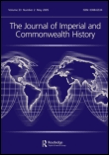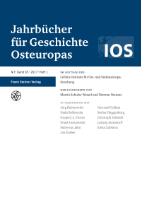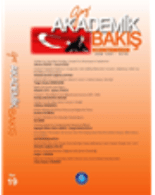
Turkish Historical Review
Scope & Guideline
Advancing Scholarship on Ottoman Narratives
Introduction
Aims and Scopes
- Ottoman Studies:
The journal emphasizes comprehensive research on the Ottoman Empire, covering its political, social, and economic aspects, as well as cultural exchanges and transformations throughout its history. - National Identity and Memory:
It explores themes related to national identity, memory, and historiography, particularly in relation to the impacts of the Ottoman past on contemporary Turkish society. - Interdisciplinary Approaches:
The journal promotes interdisciplinary methodologies that combine history with sociology, anthropology, and cultural studies, allowing for a richer understanding of historical phenomena. - Minority Studies:
There is a consistent focus on the histories of minority groups within the Ottoman Empire and modern Turkey, addressing issues of displacement, identity politics, and social dynamics. - Gender and Social History:
The journal includes research that examines gender roles and social history, contributing to discussions about women's experiences and contributions throughout Turkish history. - Historical Narratives and Reinterpretations:
The journal encourages critical re-examinations of historical narratives, challenging established views and fostering a dialogue about the complexities of Turkey's past.
Trending and Emerging
- Migration and Displacement:
Recent publications increasingly concentrate on themes of migration, displacement, and their socio-political impacts, particularly regarding the Greek-Turkish population exchange, highlighting the relevance of historical memory in contemporary debates. - Cultural Interactions and Exchanges:
There is a growing interest in cultural interactions and exchanges within the Ottoman Empire, examining how diverse communities influenced each other, which is crucial for understanding the multicultural fabric of historical Turkey. - Refugee Studies:
The exploration of refugee experiences and the role of refugee communities in shaping national identity and memory is emerging as a significant theme, reflecting current global discussions on migration. - Gender Studies:
An increasing number of papers focus on gender analysis within historical contexts, emphasizing women's roles and experiences, which aligns with broader trends in historiography towards inclusivity and diversity. - Nationalism and Identity Politics:
The journal is seeing a rise in discussions around nationalism and identity politics, particularly in relation to the Ottoman legacy and its implications for contemporary Turkish society, making it a pertinent area of study.
Declining or Waning
- Colonial Perspectives:
There has been a noticeable decrease in papers focusing on colonial perspectives of the Ottoman Empire, which may reflect a shift towards more localized and nuanced understandings of its history. - Military History:
Research specifically centered on military history, once a staple in Ottoman studies, appears to be less frequent, suggesting a growing preference for social and cultural histories over purely military analyses. - Traditional Economic History:
Traditional economic analyses of the Ottoman Empire, such as those focusing solely on trade and fiscal policies without considering broader social implications, are becoming less prevalent in favor of more integrative approaches. - Eurocentric Historical Comparisons:
There is a declining trend in comparative studies that align Ottoman history primarily with Western European narratives, indicating a move towards more indigenous frameworks of understanding. - Art and Architecture Exclusively:
Papers focusing solely on art and architecture, without connecting them to broader social or political contexts, are appearing less frequently as interdisciplinary approaches gain traction.
Similar Journals

Novyi Istoricheskii Vestnik-The New Historical Bulletin
Unlocking the Rich Tapestry of History for All Scholars.Novyi Istoricheskii Vestnik - The New Historical Bulletin, published by IZDATEL STVO IPPOLITOVA, stands as a significant academic platform in the field of history, particularly within the Russian context. With an ISSN of 2072-9286 and established in 2012, this journal aims to foster rigorous scholarship and innovative research in historical studies, enhancing discourse amongst historians, researchers, and students alike. Although it currently holds a Q3 ranking in the Arts and Humanities - History category, its commitment to showcasing diverse historical narratives and promoting academic dialogue positions it as a noteworthy contributor to the field. The journal's scope covers a wide array of historical topics, encouraging submissions that illuminate various aspects of the past, whilst also serving as a vital resource for those seeking to understand contemporary historical discourse. As an open access journal, it promotes the accessibility of scholarly work, appealing to a broad audience intent on expanding their knowledge of history.

Selcuk Universitesi Edebiyat Fakultesi Dergisi-Selcuk University Journal of Faculty of Letters
Connecting Scholars in the Pursuit of UnderstandingWelcome to the Selcuk University Journal of Faculty of Letters, a prominent scholarly publication dedicated to advancing the fields of humanities and social sciences. Published by Selcuk University, Faculty of Letters, this journal features innovative research and critical studies across various literary, linguistic, and cultural disciplines. With an Open Access model since 1981, the journal ensures that knowledge is freely accessible, fostering a collaborative academic environment for researchers, professionals, and students alike. The journal's commitment to scholarly excellence is reflected in its rigorous review process and its aim to elevate discourse within the humanities. Join a vibrant community through the Selcuk University Journal of Faculty of Letters and contribute to the shared pursuit of knowledge and understanding.

JOURNAL OF IMPERIAL AND COMMONWEALTH HISTORY
Advancing critical discourse in historical and political realms.The JOURNAL OF IMPERIAL AND COMMONWEALTH HISTORY, published by Routledge Journals, Taylor & Francis Ltd, stands as a pivotal platform for scholarly discourse in the fields of imperial studies, history, and political science. This esteemed journal, with an ISSN of 0308-6534 and E-ISSN 1743-9329, has been contributing significantly to academic discussions since its inception in 1972 and continues to publish until 2024. With its categorical rankings placing it in Q1 in History, alongside emerging categories in Development and Political Science, it appeals to a wide array of researchers, professionals, and students interested in the complexities of historical and contemporary issues within imperial and commonwealth contexts. The journal's commitment to rigorous academic standards is reflected in its impressive Scopus rankings, which position it in the top percentiles of its respective fields. While currently not an open access journal, it remains a valuable resource for those looking to enhance their understanding of historical impacts and political relations in the imperial context, thereby solidifying its role as an essential tool for scholarly exploration and inquiry.

Recent Period Turkish Studies-Yakin Donem Turkiye Arastirmalari
Fostering Scholarly Dialogue on Turkey's FutureRecent Period Turkish Studies-Yakin Donem Turkiye Arastirmalari, published by ISTANBUL UNIV, is an esteemed open-access journal dedicated to the exploration and analysis of contemporary Turkish studies. Since its inception in 2002, the journal has provided a vital platform for researchers, scholars, and students to disseminate their findings on diverse aspects of Turkey's socio-political landscape, historical context, and cultural dynamics. With its impressive Q2 ranking in History and its participation in the competitive quartiles of Sociology and Political Science, the journal situates itself as a valuable resource for academia. Covering converged years from 2019 to 2023, it invites contributions that deepen the understanding of Turkey's evolving identity in a globalized world. The journal's aim is to foster scholarly dialogue and provide an inclusive space for interdisciplinary research, enhancing its impact and reach within the global academic community. Researchers interested in innovative perspectives and rich scholarly discourse are encouraged to engage with this influential publication.

JAHRBUCHER FUR GESCHICHTE OSTEUROPAS
Enriching Understanding of Eastern Europe's Cultural ChroniclesJAHRBUCHER FUR GESCHICHTE OSTEUROPAS, published by FRANZ STEINER VERLAG GMBH, is a prominent academic journal dedicated to the exploration of Eastern European history. With its inception dating back to 1978, this journal has consistently provided a platform for scholarly discourse, contributing significantly to the understanding of the region's complex historical narratives. While the journal is not open access, it holds a solid reputation within the academic community, positioned in the Q4 quartile in history as per the 2023 category rankings, and stands at Rank #1636 within the Scopus Arts and Humanities History ranking. The convergence of its publication years throughout the decades emphasizes a long-standing commitment to historical research, thereby making it an essential resource for researchers, professionals, and students interested in Eastern European studies. Explore the intricate dynamics of historical events and cultural developments that shape Eastern Europe through this invaluable periodical.

Belleten
Advancing Historical Insights and Cultural DiscussionsBeleten is a distinguished academic journal published by TURK TARIH KURUMU, focusing on cultural studies and history. With an ISSN of 0041-4255, this journal has made significant contributions to the understanding of Turkey's historical and cultural landscape since its inception in 1971. Recognized for its scholarly rigor, it holds a notable Q2 ranking in both the Cultural Studies and History categories as of 2023, reflecting its substantial impact within these fields. The journal is accessible to a diverse audience, including researchers, professionals, and students, who seek to explore comprehensive studies and discussions on Turkish history and culture. While it does not operate under an open-access model, its commitment to high-quality research continues to resonate within the academic community. Situated in Ankara, Turkey, Beleten aims to foster scholarly dialogue and provide a platform for innovative research that addresses contemporary and historical issues relevant to Turkish society and beyond.

Gazi Akademik Bakis-Gazi Academic View
Elevating Scholarship, Connecting Communities.Gazi Akademik Bakis - Gazi Academic View is a distinguished peer-reviewed journal published by HALE SIVGIN, dedicated to fostering academic discourse and knowledge across various disciplines. Since its inception in 2007, the journal has embraced an Open Access model, ensuring that its valuable insights are freely accessible to researchers, professionals, and students worldwide. With an ISSN of 1307-9778 and E-ISSN 1309-5137, Gazi Academic View serves as a vital platform for innovative scholarship, promoting rigorous research and discussions that impact both local and international academic communities. Situated in Ankara, Turkiye, the journal's editorial strategy emphasizes inclusivity and the advancement of knowledge, making it an essential resource for anyone seeking to engage with contemporary issues in their respective fields. The journal aims to maintain a high standard of scholarly publication, often featuring studies that contribute to the evolution of theoretical and practical frameworks across multiple sectors.

RUSSIAN HISTORY-HISTOIRE RUSSE
Navigating the Rich Landscape of Russia’s HistoryRUSSIAN HISTORY-HISTOIRE RUSSE is a distinguished academic journal published by BRILL, focusing on the rich and complex tapestry of Russian historical studies. Established in 1975, this journal serves as a vital platform for scholars, researchers, and students interested in exploring the multifaceted aspects of Russia's past. With its ISSN 0094-288X, it has undergone significant evolution over the years, marking its converged publication years as essential milestones in the academic discourse surrounding Russian history. While currently not an open access journal, it is recognized for its rigorous peer-reviewed articles and contributes to the field's scholarship, as reflected in its 2023 Scopus ranking within the 49th percentile (Rank #876 out of 1760) in Arts and Humanities - History, and its Q4 quartile classification. Located in Leiden, Netherlands, the journal is committed to enhancing understanding of both historical patterns and contemporary implications, making it an essential resource for academic inquiry and research excellence.

Osmanli Arastirmalari-The Journal of Ottoman Studies
Illuminating the Complexities of Ottoman HistoryOsmanli Arastirmalari-The Journal of Ottoman Studies, published by ISTANBUL 29 MAYIS UNIV & ISAM, is a premier academic journal focusing on the multifaceted history and cultural studies of the Ottoman Empire and its enduring legacy. With a commitment to advancing scholarly discourse, this journal has successfully established itself within the cultural studies and history fields, evidenced by its current ranking in the Q3 quartile for both categories in 2023. The journal is dedicated to providing a platform for researchers, professionals, and students to disseminate original research findings spanning various disciplines related to Ottoman studies. As a crucial resource for informed analyses and interpretations of historical contexts, it invites contributions that explore the complexities of Ottoman society, politics, and culture from 2015 to 2022. Although it currently does not offer Open Access, the journal's impact on the field remains significant, fostering a deeper understanding of historical narratives that continue to shape modern cultural identities.

Turkish Journal of History-Tarih Dergisi
Fostering global dialogue through historical inquiry.Turkish Journal of History-Tarih Dergisi, published by ISTANBUL UNIV, is a prominent open access journal dedicated to advancing the field of history since its inception. With an ISSN of 1015-1818 and an E-ISSN of the same number, this journal provides a platform for scholarly exchange, featuring a diverse range of research articles that explore various dimensions of historical inquiry. As of 2023, it has achieved a distinguished placement in the Q2 category within the history discipline, ranking 1112 out of 1760 in Scopus, thus reflecting its growing influence in academia, with a percentile standing of 36th. The journal's commitment to open access since 2017 enhances its accessibility, allowing scholars globally to engage with cutting-edge research. Situated in Istanbul, Turkey, the journal serves as a vital resource for researchers, professionals, and students, fostering a deeper understanding of historical contexts and narratives.